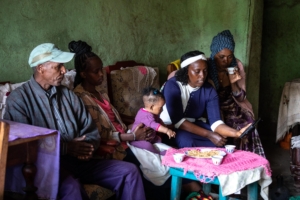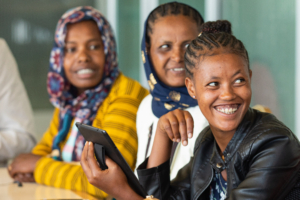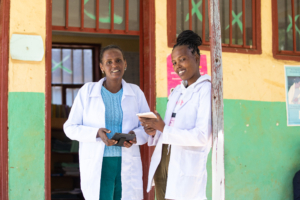When Ekram Redwan began her career in Ethiopia’s Ministry of Health in 2012, the country faced a massive shortage of health workers. “The proportion of health workers to population was way below the WHO standard,” she recalls. The flagship Health Extension Program, which trains and deploys female community health workers (known nationally as health extension workers) to communities across all regions, was just seven years old—and it was a key element in the Ministry’s strategy to tackle coverage gaps in Africa’s second-most-populous country. “From year to year the number of health extension workers has increased,” Ekram explains. “Today, we have more than 40,000.”
Still, this robust workforce faces an unmet need: effective, affordable training. “There are many challenges regarding resources,” says Ekram. “The other major challenge is in terms of quality of training. And of course there is a gap in technology—nowadays digital knowledge is leading, and most trainings are not supported by digital tools.”
Following her lengthy tenure with the Ministry, Ekram joined Last Mile Health’s Ethiopia team. As senior program manager, she manages Last Mile Health and the Ministry of Health’s development of refresher training modules for health extension workers, which uses a blended learning approach with both digital and in-person elements. Following the success of the pilot module, the Ministry formalized the blended approach as part health extension workers’ training—an exciting step for a program that previously only used paper-based training.

During a home visit in SNNPR, a health extension worker uses her tablet to share information with a new mother.
“From the quality of training perspective, the paper-based one has less learner engagement. The blended one considers local context, it considers language, there are more engaging learning videos. And the blended approach is way more cost-effective,” Ekram explains. “We are conducting pre- and post-training assessments and we have seen how the skills of the health extension workers are really improving after the training. This is really encouraging, because there have been many past assessments done by the Ministry of Health showing that health extension workers lack skills in some areas of care they are delivering.”
Investing in community health is critical to changing health outcomes in Ethiopia, says Ekram. “Easily preventable communicable diseases are prevailing in the country, in terms of the disease burden,” she notes. “To address this, enhancing community awareness and engagement is really critical. That’s actually the rationale behind introducing the Health Extension Program. The aim is ensuring health service down to the community level. Health extension workers do the prevention part, they do home-to-home education as well as provide clinical services. They ensure healthcare at the community level and with this, they can improve most health indicators, particularly in reducing maternal and child mortality and reducing hygiene-related communicable diseases.”
Importantly, community-based primary care is affordable—even for a country with such a large population. “Secondary and tertiary care require a significant amount of resources which could be difficult for Ethiopia to afford, but [primary care comes] with minimal cost. With this, we can easily increase the health of the community and the country.”
A strong, skilled community workforce can save lives in Ethiopia’s rural and remote communities. What support do health extension workers need to ensure this is a reality? “They have to be supported with trainings and this training has to be engaging and easy to understand,” says Ekram. “The other challenge that we can see from different reports is a shortage of equipment, medical supplies, and the like in their health posts. Even the infrastructure, the number of health posts versus population.” Critical, too, is paying health extension workers fairly—and offering them opportunities for development. “It’s been almost two decades since the program started and nowadays because of the workload, because of lack of career path and other reasons, most of the health extension workers are dissatisfied. There’s a need to have incentive mechanisms, recognition mechanisms, ways to advance their careers.”
Throughout her own career, Ekram has witnessed exciting progress—but much remains to be done. To partners, leaders, and stakeholders, Ekram says, “Ethiopia should be free from illness from easily preventable diseases. Let’s prioritize community health.”






